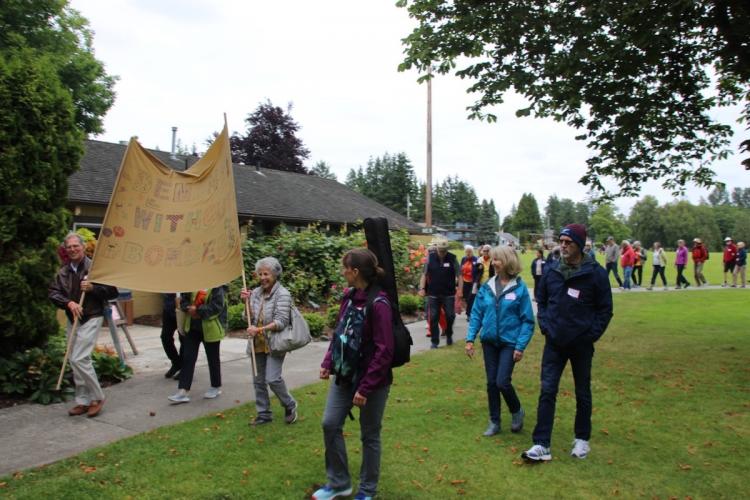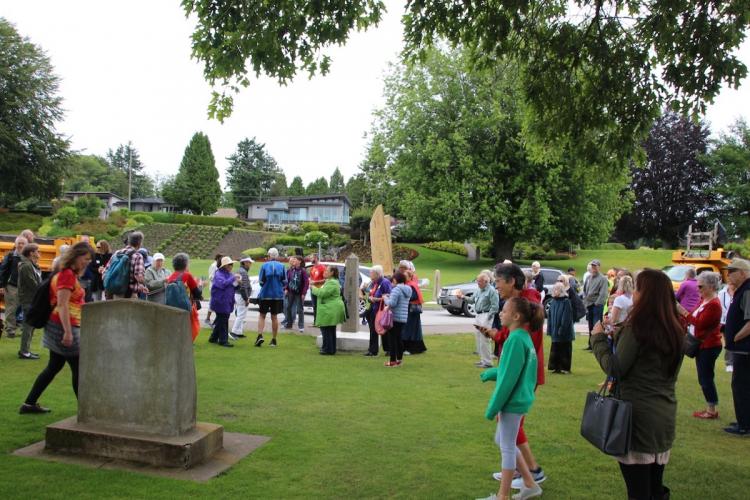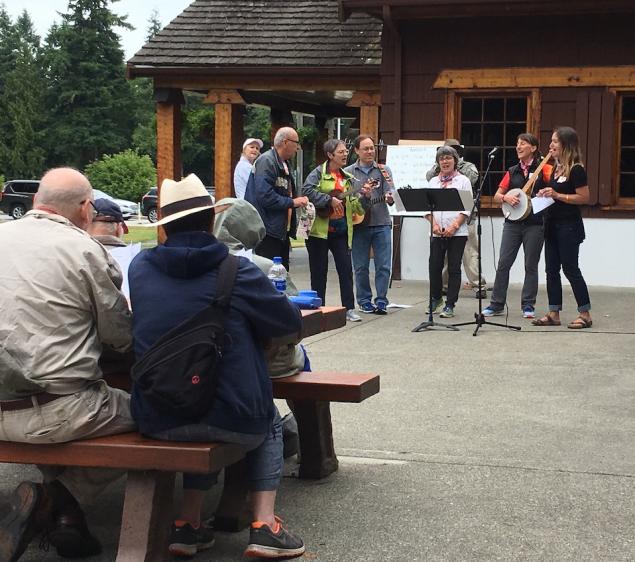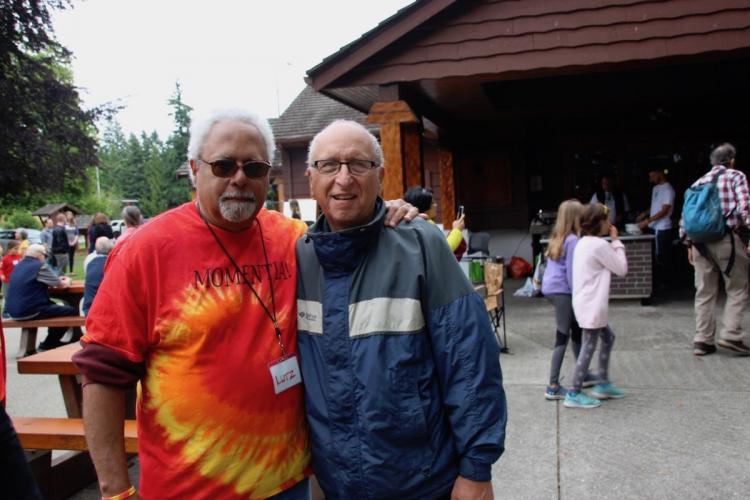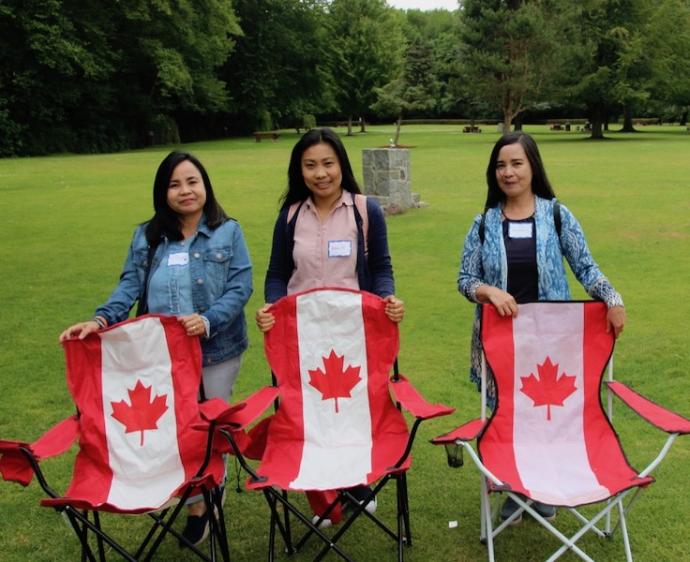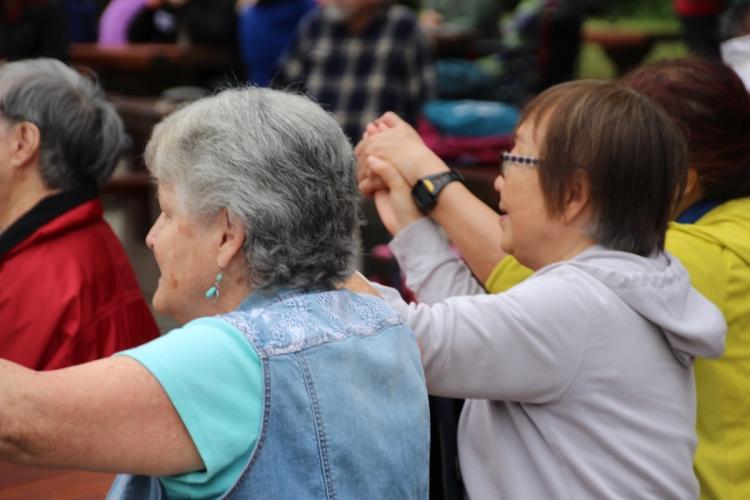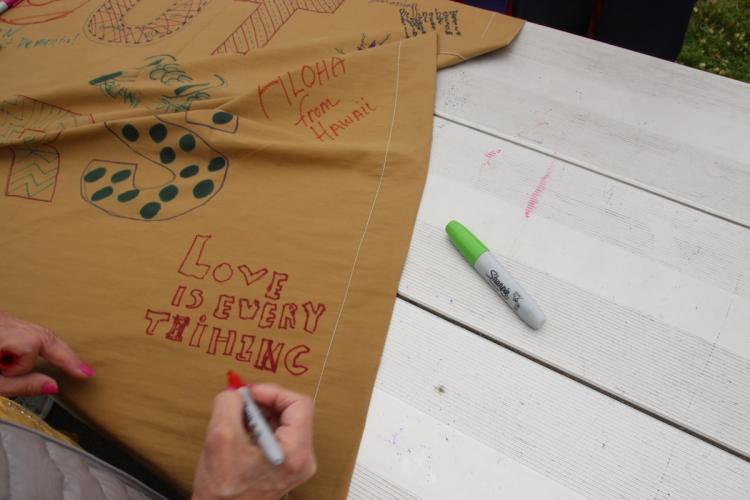"A kaleidoscope of experience" is how one participant, a poet named David Leek, described the July 3rd, 2019 Dementia Without Borders event, a first-of its-kind celebration at the Peace Arch Provincial Park in Surrey, BC.
The festival, co-hosted by UW Memory and Brain Wellness Center and the UBC Centre for Research on Personhood in Dementia, aimed to celebrate the creativity, advocacy, and social citizenship of persons living with dementia. The event reflected efforts of many in the Pacific Northwest to reinforce the rights and strengths of community members who live with dementia. These include increasing resources such as post-diagnosis education and support, as well as dementia awareness training in the community, to ensure persons with dementia receive the respect and inclusion they deserve.
True to the description of a "kaleidoscope of experience," the festival offered a dynamic, ever-shifting glimpse of the colorful world a person with memory loss can inhabit. The elements of the day included a march across a park with enormous homemade banners, live performances of music and poetry, exhibits of art, dancing, Tai chi, food, and socializing. The day also provided a place in which talking about dementia felt easier and normal. All day, people swapped stories among others about their experience with a disease, or their work in a related field.
“For me, Dementia Without Borders is about the shared experience of living with dementia or caring for someone with dementia. I was excited to share with other people what we’re doing here in Seattle, and to find out what they’re doing in Canada,” says Paula Schwimmer, a planning committee member whose husband Rafe lives with dementia and participates in many Momentia Seattle activities.
The event's location, the Peach Arch Provincial Park, was a meaningful spot for a celebration of inclusion and belonging, as it is free, open to the public, and accessible from both sides of the border without a passport. As Canadian dementia advocate Myrna Norman noted in her opening remarks, “We are here to make new friends, so welcome to this spot between Canada and the US with no wall and no border." Before the festivities commenced, the group recognized the land as unceded ancestral territory of the Semiahmoo Nation.
For a number of attendees, the most dramatic moment occurred at the very beginning of the day, as the American and Canadian groups marched in long lines from opposite sides of the park towards the famous Peace Arch sculpture at the border. "That moment when the other group came into view and we walked towards each other to meet for the first time—it was an incredible feeling," says Cayce Cheairs, Dementia-Friendly Recreation Specialist at Seattle Parks and Recreation. "My heart leapt." Upon meeting, each person traded their bright orange Dementia Without Borders bracelet with a stranger, who quickly became a friend.
Returning together to the event venue for BBQ lunch provided by Dementia Support Northwest, attendees enjoyed a stunning musical welcome from Pastor Patrinell Wright, Founder of the Total Experience Gospel Choir. Her powerful rendition of the song Reach out and Touch set the tone for the event, with its message about working together for a better world.
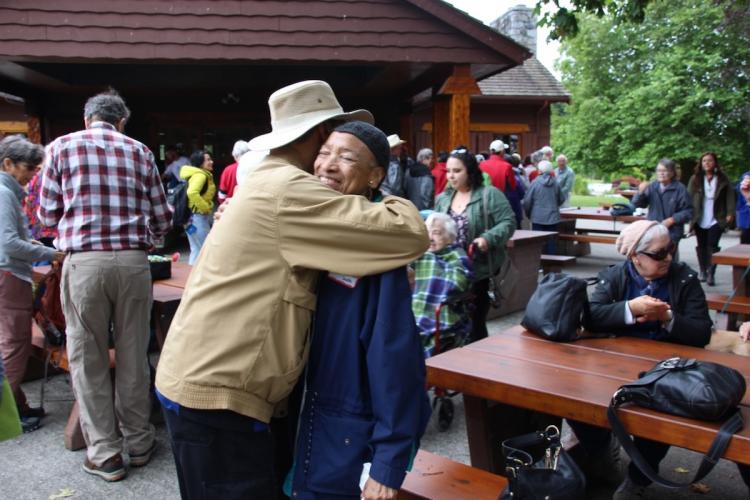
Pastor Patrinell Wright, Founder of Total Experience Gospel Choir gets a big thank you after her performance.
The event continued against a backdrop of artistic performances by people living with memory loss and their community advocates.
Seattle community member David Leek read his poem For Now, a meditation on living with memory loss. His poetry can be read on the MBWC website: 'The Wonderful Awareness of Living by David Leek; Some members of the Dementia Without Borders planning committee performed 'Cascadia,' a new song written by Lee Burnside, MD, geriatrician at the UW MBWC. The singing group included Alison Phinney and Gloria Puurveen of the UBC, Lee Burnside and Marigrace Becker of UW MBWC, and Seattle community members Paula and Rafe Schwimmer. Watch.
An art exhibit displayed a variety of creative work, from watercolor by Seattle advocate Myriam Marquez, to masks by residents of the Louis Brier Care Home, as well as sculpture, collage and photo portraits. Meanwhile, a cinema showcased films made by or about persons with memory loss, such as “Living with Memory Loss: In Our Own Words” by members of the Greenwood Senior Center. Others created art on the spot, decorating quilt squares on the theme of what community means to you.
Dr. Burnside, who is interested in the role of arts for people with dementia, found that the performances reinforced his hypothesis. "It is so important for people living with dementia to continue to express themselves through dance, singing, and art. It provides a way to create a personal history and legacy. But, how do we reach more people?"
And for the researchers and community organizers who have pushed forward dementia-friendly philosophy and pushed back on narratives that define people only by their disease and create stigma and fear, the event signaled a welcome shift.
"Many of us who are a part of dementia-friendly initiatives meet each other at individual programs and small events, in our own corners of the country," says Marigrace Becker, MSW, Program Manager of Community Education and Impact of the UW MBWC. “We often talk about how the dementia-friendly community movement is spreading around the world. But today, in the company of so many people united in this common cause, made it feel real. This is a special moment in history.”
"Something important is happening here," said Deborah O'Connor, PhD, RSW, founding director of the UBC Centre for Research on Personhood and Dementia, whose interdisciplinary work recognizes that the dementia is both a biomedical condition and a social condition determined by how others treat people living with memory loss or dementia. For many, and for a long time, a diagnosis of dementia has meant fear, shame, and social isolation. "This kind of event wouldn't have happened 20 years ago. There is a shift happening."
One participant captured Dr. O’Connor’s meaning in one sentence: "Thanks for the wonderful day where we celebrated life instead of being told how the end is coming.”
Attendees of the event included people living dementia, care partners, medical and social service professionals, health sciences students, and many people who had simply heard about the event from friends or family. Advocacy organizations including Dementia Support Northwest, Alzheimer's Association WA State Chapter, and Alzheimer Society of B.C., distributed local resources.
Like looking into a kaleidoscope, the experience of dementia can involve disorientation and uncertainty; but it can also offer a new perspective on life, presence, and motivation to try new forms of creativity. In the same way, Dementia Without Borders offers a lens into how the world could be a better place for people living with dementia: "Let's imagine persons living with dementia and caregivers feeling dignified and feeling hope and feeling promise," said Myrna Norman, who lives with symptoms of frontotemporal dementia, "and their caregivers feeling those emotions too. Imagine feeling value and our caregivers feeling value."
But, that day, the group of hundreds at the Peace Arch didn't have to imagine anything at all. •
-Genevieve Wanucha
Members of the Dementia Without Borders organizing committee: Alison Phinney, Paulina Malcolm, Gloria Puurveen, Rebecca Hung (British Columbia); Marigrace Becker, Lee Burnside, Paula Schwimmer and Linda Anderson (Washington State)
All photos courtesy of the UW MBWC and UBC.

